|
|
|
Sort Order |
|
|
|
Items / Page
|
|
|
|
|
|
|
| Srl | Item |
| 1 |
ID:
186349
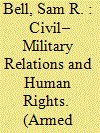

|
|
|
|
|
| Summary/Abstract |
Do civil–military relations influence human rights practices? Building on principal–agent theory, we argue that civilian–military relations, instead of having an effect on mean levels of repression, will be associated with the dispersion in human rights practices. States where there is less control of the military or more conflict between civilian and military leadership will see a wider range of human rights practices. We test our hypotheses quantitatively on a global sample of countries, using updated data on civil–military relations and find evidence that civil–military conflict and lack of control increase the variance in human right practices.
|
|
|
|
|
|
|
|
|
|
|
|
|
|
|
|
| 2 |
ID:
186342
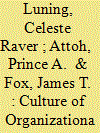

|
|
|
|
|
| Summary/Abstract |
With the backdrop of the utility of grit at the individual level, speculation has begun to circulate that grit may exist as an organizational level phenomenon. To explore this potential construct, this study used an exploratory, qualitative research design. This study explored grit at the organizational level by interviewing leaders’ perceptions of what may be a culture of organizational grit. Participants included 14 U.S. military officers. Seven themes emerged relative to the research question: “What do U.S. military officers perceive as a culture of organizational grit?” Themes included professional pride, team unity, resilience-determination, mission accomplishment, core values, growth mindset, and deliberate practice. This study indicated that a culture of organizational grit is likely a combination of converging organizational elements. Overall, findings indicate that there may be a culture of organizational grit in the military and at the least, more research examining the concept is warranted.
|
|
|
|
|
|
|
|
|
|
|
|
|
|
|
|
| 3 |
ID:
186341
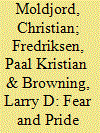

|
|
|
|
|
| Summary/Abstract |
This article analyzes the combat emotions of Royal Norwegian Air Force Fighter pilots (hereafter RNoAF) during their bombing campaign over Libya in 2011. Using grounded theory in our interviews with them, we identified 12 categories of their emotions and behaviors, with variations in pride and fear emerging as the two key themes. We show how those two emotions thread through the literature of emotions in combat, and show further how our data, and the resulting matrix from an analysis of it, both apply to and extend that literature. We also show how the high and low variations of pride and fear interact to both support and counter each other. Our findings thus make an important contribution to the combat emotions literature on the action and behavior of fighter pilots.
|
|
|
|
|
|
|
|
|
|
|
|
|
|
|
|
| 4 |
ID:
186350
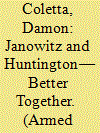

|
|
|
|
|
| Summary/Abstract |
Suzanne Nielsen and Hugh Liebert recently published “The Continuing Relevance of Morris Janowitz’s The Professional Soldier for the Education of Officers” in which they argued that officer education is too enamored with Samuel Huntington’s aging theory of civil–military relations from Soldier and the State. Huntington’s ideal of objective control grants senior military advisors autonomy within their professional sphere, and it best ensures that unvarnished military expertise survives politically charged national security decision making processes intact, regardless of which party controls the White House. While these features explain Huntington’s traditional popularity with the military, Nielsen and Liebert warn that Huntington’s separation between military and civilian matters in theory engenders wishful thinking in practice, so much so that officers neglect, to the detriment of national policy, Morris Janowitz, Huntington’s cofounder of the modern study of civil–military relations. However, the civil–military community should reconsider banishing Huntington in order to appreciate Janowitz.
|
|
|
|
|
|
|
|
|
|
|
|
|
|
|
|
| 5 |
ID:
186344
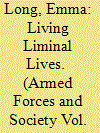

|
|
|
|
|
| Summary/Abstract |
The emotional cycle of deployment theorized by Logan and adapted by Pincus, House, Christenson, and Alder is often applied by academics and military support agencies to define, explain, and provide advice on the experiences and possible emotional reactions of military families during phases of deployment. Interviews with army partners showed that spatiotemporal experiences and perspectives are more complex than those afforded by the emotional cycle of deployment. This article argues that applying the concept of liminality uncovers some of this complexity, illuminating the in-between times experienced during deployments that are otherwise hidden. Army partners move through and between deployments and deployment phases haunted by specters of past and future deployments. By disrupting seemingly chronological and discrete spatiotemporal narratives, which often frame research on military families and deployment, this article demonstrates how army partners move through and between deployments and deployment stages negotiating past and future deployments. It shows how they continuously adapt and evolve practices while negotiating interpreted pasts and imagined futures in pursuit of becoming “ideal.”
|
|
|
|
|
|
|
|
|
|
|
|
|
|
|
|
| 6 |
ID:
186343


|
|
|
|
|
| Summary/Abstract |
Current debates about bathrooms and bathroom policy contribute to a long history of how space shapes norms and expectations about privacy and gender equity in the workplace. The military serves as a significant site of discussion, particularly as the Department of Defense moves forward with efforts to integrate women into combat positions. Relying on an analysis of 27 focus groups with a total of 198 participants we collected from Special Operations in the U.S. Army, we examine bathrooms as a site where male soldiers contest and resist female integration. Using Sasson-Levy and Katz’s concept of institutional de-gendering and re-gendering, we argue that men’s resistance to gender-neutral toilets is an effort to re-gender Special Forces and maintain the hegemonic masculine culture that acutely defines it.
|
|
|
|
|
|
|
|
|
|
|
|
|
|
|
|
| 7 |
ID:
186348


|
|
|
|
|
| Summary/Abstract |
The Grand Army of the Republic (GAR) played a critical role in the lives of many Union veterans after the Civil War. Its efforts were supported by its women’s auxiliary, the Woman’s Relief Corps (WRC). Yet scholars do not know much about the evolution of the relationship between the rising WRC and the slowly declining GAR, whose members were dying away in the early 20th century. Here, we evaluate state-level membership and local group data for both associations to determine the nature of their connection from 1884 to 1924. The evidence reveals that the WRC’s auxiliary role helped sustain the GAR while providing an organizational structure that allowed women to chart an independent course.
|
|
|
|
|
|
|
|
|
|
|
|
|
|
|
|
| 8 |
ID:
186347
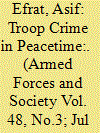

|
|
|
|
|
| Summary/Abstract |
U.S. forces abroad have often faced complaints about crimes committed by troops, yet we lack systematic quantitative information on such crimes. Based on newly discovered data compiled by the Army, this article presents a comprehensive and detailed picture of American troops’ criminal activity worldwide during the Cold War (1954–1970). The data show that troops engaged in significant criminality, with a particularly high rate of violent crime—homicide, rape, and robbery—and a relatively low rate of property crime. Host countries treated offending troops leniently: Prison sentences were rare, and they averaged less than 2 years in duration. The data presented here hold far-reaching implications for our understanding of the relations between U.S. forces and host countries and the legacy of U.S. military deployments.
|
|
|
|
|
|
|
|
|
|
|
|
|
|
|
|
| 9 |
ID:
186345
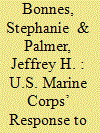

|
|
|
|
|
| Summary/Abstract |
In this article, we show how the U.S. military treats domestic violence and sexual assault as distinct forms of abuse, which has particular consequences for victims of intimate partner sexual violence. We explore how a specific U.S. military branch, the Marine Corps, complicates these issues further by providing services to intimate partner sexual violence victims from two different programs. Analyzing military orders and documents related to Family Advocacy Program and Sexual Assault Prevention and Response program, interviews with eight military prosecutors, and the experiences of one military lawyer, we examine program and interactional-level factors that shape victim services, advocacy, and processes. We find that there are program differences in specialized services, coordinated services, and potential breaches of confidentiality related to victim’s cases. We recommend that the Marine Corps recognize the intersections of sexual violence and domestic violence and offer more tailored services to victims of intimate partner sexual violence.
|
|
|
|
|
|
|
|
|
|
|
|
|
|
|
|
| 10 |
ID:
186340
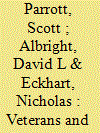

|
|
|
|
|
| Summary/Abstract |
The mass media are an important source of information concerning military service personnel and veterans. Veterans, veterans organizations, and others have criticized the mass media for providing the public shallow representations of veterans and military service in which veterans are heroes traumatized mentally and/or physically by their service. Despite the concern, scant research has empirically examined how exposure to such content affects public perceptions of veterans. Using an experiment, this study examined how exposure to news stories of military veterans informed thoughts, attitudes, and support intentions toward veterans. Results suggest short, one-time exposure to stereotypical news stories can lead readers to perceive an increased likelihood veterans will experience post-traumatic stress disorder and, in turn, feel less desire to be socially close with veterans. However, exposure to a story that challenges stereotypical representations of veterans appears to mitigate the effect. In addition, news exposure can influence support intentions related to veterans.
|
|
|
|
|
|
|
|
|
|
|
|
|
|
|
|
| 11 |
ID:
186346


|
|
|
|
|
| Summary/Abstract |
Many contemporary security issues entail the domestic military deployment, which is deemed to blur the division between armed forces and police. This argument relies on the theoretical coalescence between territory, political authority, and community. In contrast, I argue the military domestic deployment is largely grounded on the process of defining and redefining the boundaries of the community to be protected, which informs the organization of the instruments of force and is shaped throughout the process of legitimizing a particular kind of violence deployment. This article analyses the parliamentary minutes on three domestic military operations in Brazil—Operation Rio (1994), Operation Arcanjo (2010), and the Operation Rio de Janeiro (2017)—through the moral exclusion framework and shows that the debates about whether or not the armed forces should be deployed are embedded in the struggle of drawing the community’s boundaries.
|
|
|
|
|
|
|
|
|
|
|
|
|
|
|
|
|
|
|
|
|